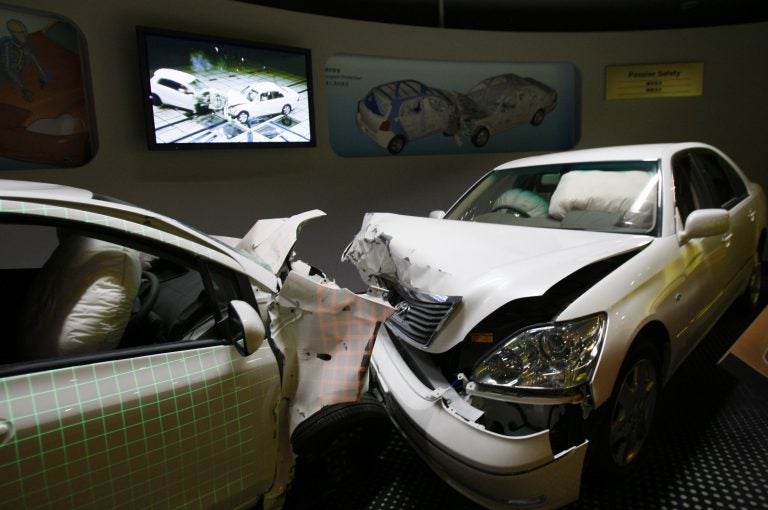Philly cops are getting inside the ‘black box’ of city’s rising traffic fatality problem
Philadelphia police are getting access to the black boxes behind car crashes in the city. The data will help investigators understand why collisions happen.

Crashed cars with airbags deployed are shown to visitors as part of the display of Toyota Motor Corp.'s safety performance standards, called "Global Outstanding Assessment," at the automaker's exhibition hall in Toyota, central Japan, Thursday, March 4, 2010. Toyota has for years blocked access to data stored in devices similar to airline "black boxes" that could explain crashes blamed on sudden unintended acceleration, according to an Associated Press review of lawsuits nationwide and interviews with auto crash experts. (AP Photo/Shuji Kajiyama)
The Philadelphia Police Department wants to think inside the box to better understand traffic crashes.
Thanks to a grant from the Philadelphia Police Foundation, crash investigators will soon be able to access data from inside a vehicle’s event-data recorder, better known as the “black box.”
The software, triggered by sudden changes in speed or problems with an engine, records relevant crash information like how fast a car is going and whether airbags deploy. The data then helps investigators understand the moments that led up to a collision.
Most newer model cars are outfitted with the boxes, and throughout the nation, they’ve provided valuable insight to investigators. Philadelphia, however, hasn’t until now had the resources to analyze them, forcing the department to rely on state police for investigations.
Philly’s move to get black box data comes after years of advocacy from people like Laura Fredricks, co-founder of Families for Safer Streets Greater Philadelphia. Fredricks lost her daughter Emily to a crash in 2017. She was “shocked and angry” upon learning the city’s police department had to rely on another agency to investigate crashes, she says.
“The more information that they can get with regard to each individual crash…the more tools they have at their disposal, the better it will be all the way around,“ Fredricks said.
The $30,000 Police Foundation grant was approved in September, just a few weeks before the city released a report on Vision Zero, the Kenney administration’s effort to reduce traffic deaths to zero by 2030. The report revealed that traffic fatalities are on the rise in the city, with 91 people killed in crashes in 2018. Philadelphia’s traffic death rate is more than double that of New York City,” according to the city report.
“It made sense to us that this would be a tool that would be really helpful,” said Maureen Rush, president of the foundation, which provides training and resources to the department.
The PPP is in the early stages of procuring the equipment, officials said. They don’t have a set date for when the new system will be in place and declined to comment any further.
The U.S. National Highway Traffic Safety Administration in February rescinded an Obama-era proposal to mandate black boxes in all new vehicles. While car manufacturers install them voluntarily, the agency still has a list of required data boxes must capture. That includes speed, airbag deployment, seat track position, and whether the seat belt was worn.
Such information helps investigators replicate a crash and the preceding details.
“It’s very important for eliminating any claims in court that the speed estimates and other information produced manually by accident investigation investigators were incorrect or invalid,” said Rush.
WHYY is your source for fact-based, in-depth journalism and information. As a nonprofit organization, we rely on financial support from readers like you. Please give today.







